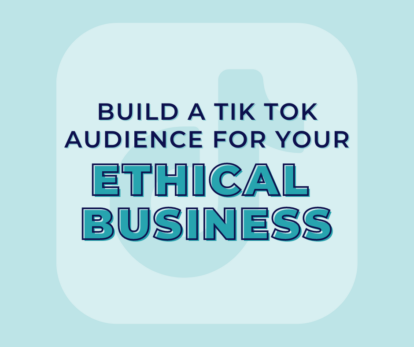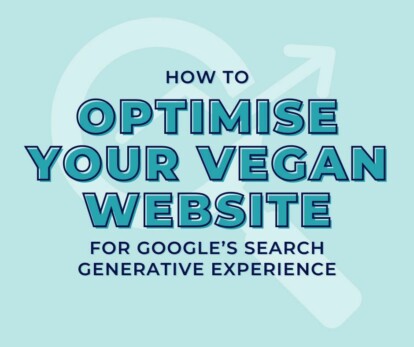Four Stats and Five Accounts to Help Build an Audience on TikTok


With ChatGPT and other AI tools now in widespread use, the digital landscape has changed forever. Computer learning has been an integral part of life online since the internet’s start; it’s just that AI is finally ready to take centre stage.
This will affect anyone who runs an organisation with an online presence, vegan or not.
If you’re not a search engine optimisation (SEO) specialist, SEO can feel daunting, especially when major changes are afoot!
In today’s blog, we’ll walk you through some of the ways in which AI usage and generated content may affect SEO soon. We’ll also supply some practical tips about things you can do in your vegan business to boost your visibility in searches.
The recent breakthroughs in AI technology are reimagining what search engines can do and how we receive and interact with information online. It’s likely that 2024 will see major shifts in how search results look and feel.
Whereas we might currently have to make several searches to build up information about a topic, Google is developing what it calls its “Search Generative Experience (SGE)”. This uses AI to give a snapshot of key information about a topic with links and suggestions to help you find out more.
The Search Generative Experience will allow people to make more conversational searches and carry the context from one search to another to provide comprehensive, meaningful results.
Google hopes to create a powerful online shopping experience, too.
Search results will highlight noteworthy factors for people to consider before they buy and then present a selection of suitable products, complete with recent reviews, ratings, prices and product images.
Shopping with generative AI is built on Google’s Shopping Graph, which holds more than 35 billion shopping listings, 1.8 billion of which are updated every hour!
Google is currently testing its Search Generative Experience in Search Labs. This means it’s available to a limited number of people who have signed up to test it (in countries where Search Labs is available). Experts are saying that UK users may be able to try out the Search Generative Experience towards March time, but nothing has been confirmed.
This new search experience won’t be rolled out universally until it has undergone extensive testing. You can visit Search Labs at the link above to sign up for the waiting list for testing in your country.
Right now, if someone searches for “best vegan restaurant near me”, for example, Google will return a list of results. It’s then up to the searcher to seek out reviews or to visit individual websites to decide which seems like the best restaurant to visit.
With Google’s Search Generative Experience, people will see paid ads and organic listings for local vegan restaurants alongside blog content, statistics, location information, current reviews, and ratings. In this way, several different websites could appear in the same panel.
The searcher can then either follow jumping-off points to web content or ask follow-up questions. Google will remember the original search – and any subsequent questions – to refine the search results. The more it knows about context, the more relevant the results will be.
You can give your vegan business a better chance of appearing in these searches by ensuring that you have the following in place before SGE is rolled out:
One article from Rose Marketing Solutions suggests that SGE’s filters may look for businesses and products that have a star rating of 4.0 and above (out of five). It’s likely that SGE will pull key information from reviews, assuming that people talk about the elements of a place, product or service that matter most to them. For this reason, it’s important that you check all your reviews because any incorrect information could be used by Google.
Tip: Think about mechanisms you can put in place to ask for reviews, such as a quick request via email with a link to your Google reviews or a QR code by your point of sale. Take the time to respond to reviews. If someone says something negative, be constructive and transparent in your response. If the information is incorrect, respond with a correction.
When was the last time you reviewed your website?
Is every page up to date, including your blog articles? Have you included the most current information about your opening hours, products or services? When did you last publish a blog article? Does your website tell the story of your business? Do you share your ethical credentials? If there are FAQs from your customers, does your website answer them?
Google’s intention has always been and continues to be to provide searchers with relevant information as quickly and efficiently as possible. Google understands that when someone makes a search, there’s an intention behind it – they want or need something in particular.
The websites that will perform the best in the SGE landscape are those that really understand their audience and meet their needs.
Tip: Work through your website from the most popular pages through to those that you might have forgotten about. Do they contain valuable information? How easy are they to find and read? What needs updating?
Think about the top-level questions people might have about your organisation when they first encounter it, but also about the questions they might have as their knowledge deepens – this will help Google to show more of your content as the context of a search becomes clearer.
In December 2022, Google confirmed that its E-A-T guidelines (Expertise, Authoritativeness, and Trust) were getting an extra E in the form of Experience.
The updated E-E-A-T guidelines set out the search engine’s intention to prioritise in searches web pages that show that the content comes from someone who is experienced, who has expertise and authority in their field and who can be trusted.
This will continue to be at the heart of the Search Generative Experience.
Tip: Look at how your website demonstrates E-E-A-T.
If, for example, you are certified by a recognised vegan body, then highlight this. If you’ve done plenty of research into your suppliers to prevent greenwashing, then share this with your audience so that they understand why they can trust you. If you’ve been on a personal journey as a vegan, put this story at the heart of your website.
Screenshots of example SGE results suggest that images and videos may soon be more prominent. They’re also a fantastic way to break up copy-heavy pages and engage users (as long as they load quickly!)
Tip: Look at the images and videos on your site. If you have a relatively long video, you might want to explore editing it into shorter, bite-sized videos that explore different points of the same topic. You can use short videos from your social media.
Think too about having some pictures taken of your organisation, products, buildings or people. This will help to give your website visitors a sense of who you are and what you do and will be unique to your business rather than stock photos.
Using structured data and Schema markup can help search engines understand the visual content on your site. And remember to use suitable alt tags, closed captions or subtitles to make sure your visual content is accessible.
In June 2023, Search Engine Land reported that Google’s SGE had started pulling photos and reviews from Google Business Profiles for its AI snapshots. Your Google Business Profile provides an opportunity to connect with searchers and to share a surprising amount of information with potential members of your audience before they even land on your website.
Tip: If you haven’t claimed your Google Business Profile, now is the time to do it! If you already have a profile, it could be ready for an update.
Think about sharing professional-quality images of your premises, your products, your story, your people, or your latest news. You can add links to your blog articles, too, or answer FAQs. This is also the perfect place from which to ask your customers for reviews.
Search engines such as Google are constantly tweaking and refining their algorithms. In fact, it’s estimated that Google conducts 500-600 algorithm updates a year, but we rarely hear about them unless there’s a significant algorithm update that shifts the search landscape.
In 2024, it’s likely that some of Google’s algorithm updates will be around semantic search, which is a search engine technology that interprets the meanings behind words and phrases.
Google wants to understand the intention or context behind a search and uses a mix of natural language processing (NLP) and AI to understand the nuances of language. The more semantic search improves, the more search engines can understand conversational or ambiguous searches.
Tip: Again, this is where understanding your audience will help your vegan business to stand out. Think about the language your audience uses to talk to you or to ask questions or in reviews.
Instead of rigidly peppering a web page with one specific keyword or phrase, try to talk to your audience in a natural way, using the terms and expressions related to a topic that would be meaningful to them.
Due to semantic search, Google understands that “plant-based”, “non-meat”, “plant-eating”, etc., all mean the same thing as “vegan” or certainly that they’re in the same ballpark!
Mobile web browsing has been on the increase since 2009 and officially overtook desktop for the first time in 2016. Today, 57.87% of all searches are done on a mobile device.
Google is likely to continue prioritising web pages in search results that offer a fantastic user experience on mobiles.
Tip: Look at your website on a mobile device to check that everything is displaying correctly. Are clickable buttons big enough and spaced apart enough to be easily used? Do any images disappear off the screen? Does all the text display correctly?
Google’s algorithms already look for websites that load quickly and have a responsive design. This will be even more important in the future.
Google made some major changes back in 2018 to encourage businesses to ensure their websites were secure. Six years on, and site security is still a priority. Google wants to send people to websites where they can browse safely.
Tip: As well as having a suitable security certificate, look at other ways you can ensure that your website is safe for visitors. If you have a WordPress site, for example, check your plugins are up to date, as older versions may have security loopholes. Consider changing Admin usernames to something harder to guess than “Admin” and changing the admin log-in URL so it doesn’t include wp-admin. You might also want to look at security measures such as two-factor authentication.
While all the things we’ve talked about today are important, please don’t panic. The secret to SEO success in 2024, especially for ethical businesses, is YOU.
No one else shares the same story as you or the same voice, but there is an audience out there that shares your mission and ethics, and they want to hear from you.
If you can approach your website as a vehicle to connect with that audience for meaningful conversations and to provide them with genuinely valuable content, you should see your efforts rewarded by Google, too.
Prioritise transparency and building up trust, and you should find your content evolves from this, helping you to carve out a distinct presence in searches.